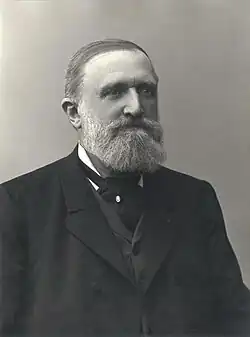Heinrich Georg Franz Stockmann

Heinrich Georg Franz Stockmann (14 January 1825, Ritzerau, Prussia – 6 January 1906, Bad Kreuznach, German Empire) was a German-born Finnish businessman and merchant active in Helsinki, Finland. He is best known as the founder of Stockmann, which became one of the largest and most influential department store companies in the Nordic region.[1][2]
Early Life and Background
Stockmann was born in 1825 in Ritzerau, near Lübeck, Prussia. His father, Joachim Franz Hermann Stockmann, was a forester. He gained early work experience in colonial goods and chemical shops in Lübeck and Hamburg between 1840–1852. Stockmann considered emigrating to America but instead found an opportunity in Finland.[1]
Move to the Grand Duchy of Finland
In 1852, Stockmann arrived in the Grand Duchy Finland to work as bookkeeper and cashier at the Nuutajärvi glassworks. When the glassworks opened stores and outlets in southern Finland, Stockmann managed a new shop in Helsinki, initially opened near the Market Square in 1859. The store operated under Stockmann's supervision and later his name.[1]
Founding of Stockmann in 1862
On 1 February 1862, Stockmann purchased the Helsinki shop outright - an event now considered the founding date of the Stockmann company. Under his leadership, the business expanded its product range beyond glassware and textile goods to include household articles, tools, and various imported items. The company quickly grew to become one of the largest retailers in Helsinki by the early 1870s. Hardware became a particularly successful business area, supporting rapid urban growth.[1]
Development and Innovations
Stockmann became a Finnish citizen in 1860 and received bourgeois rights in 1861. In 1880, he was granted the honorary title of Kauppaneuvos ("Commercial Counselor"). The same year, Stockmann moved the store to a larger space in the Kiseleff building by Senate Square - introducing Finland's first continental department store with features like large display windows and centralized payment desks. The business diversified, opening new departments and branch stores. In 1902, Stockmann converted his store into a limited liability company with his sons Karl and Frans as shareholders.[1]
Legacy and Succession
Heinrich Stockmann died in 1906. After his passing, leadership continued with his sons, especially Karl and Frans Stockmann. The business continued its expansion, and the Stockmann department store in Helsinki grew into a national and then international retail landmark.[1]
Personal Life
Stockmann’s family included several children, notably Karl and Frans, who were active in the company. Stockmann was naturalized as a Finnish citizen and became an integral part of Helsinki’s business community.[1]